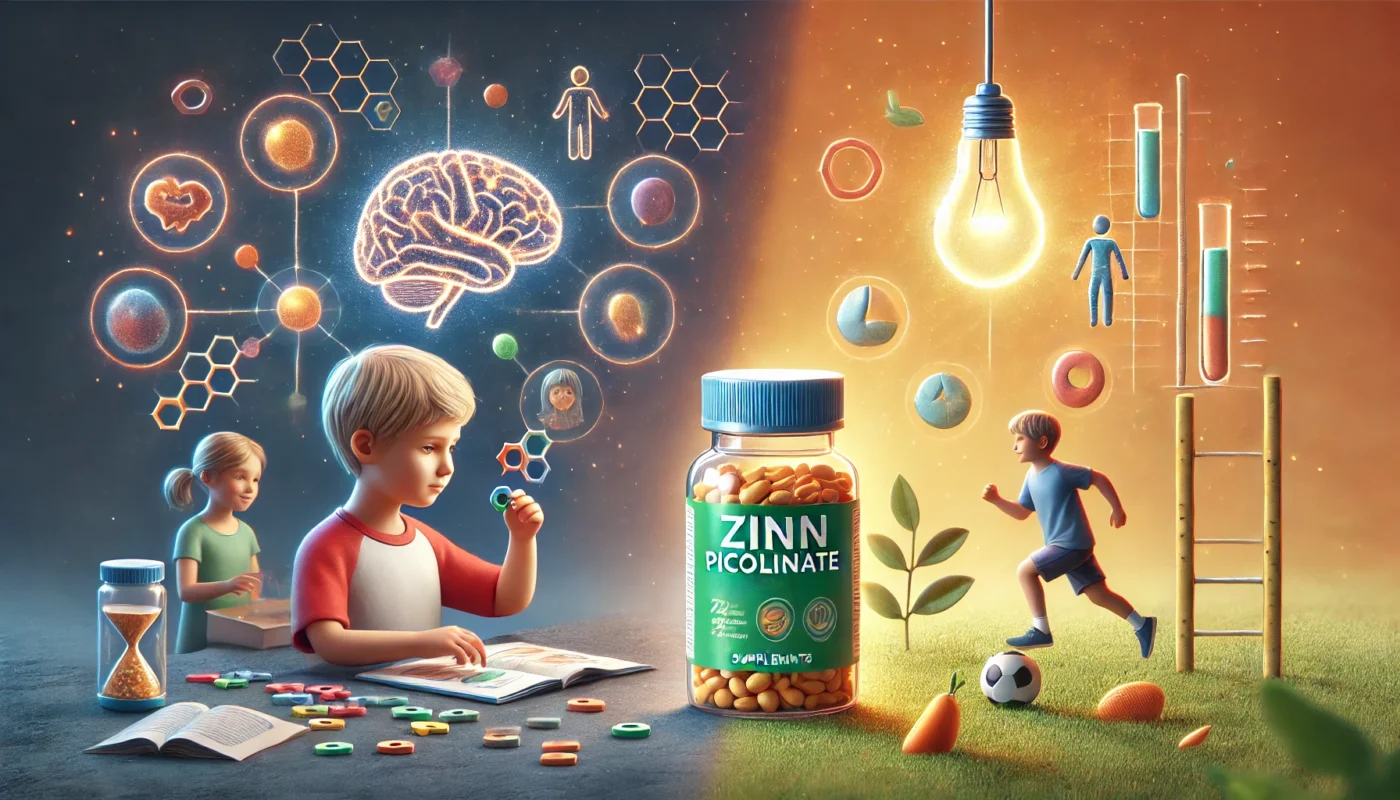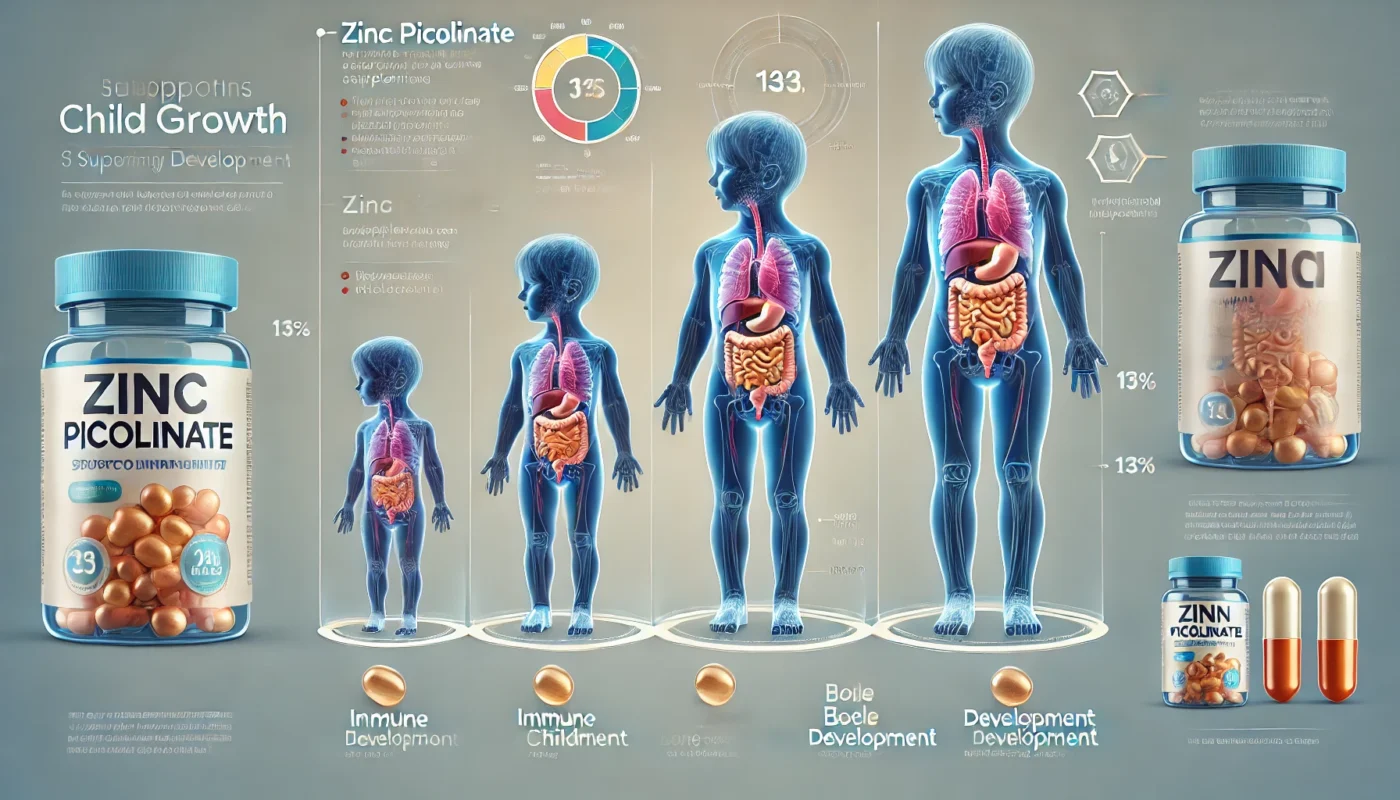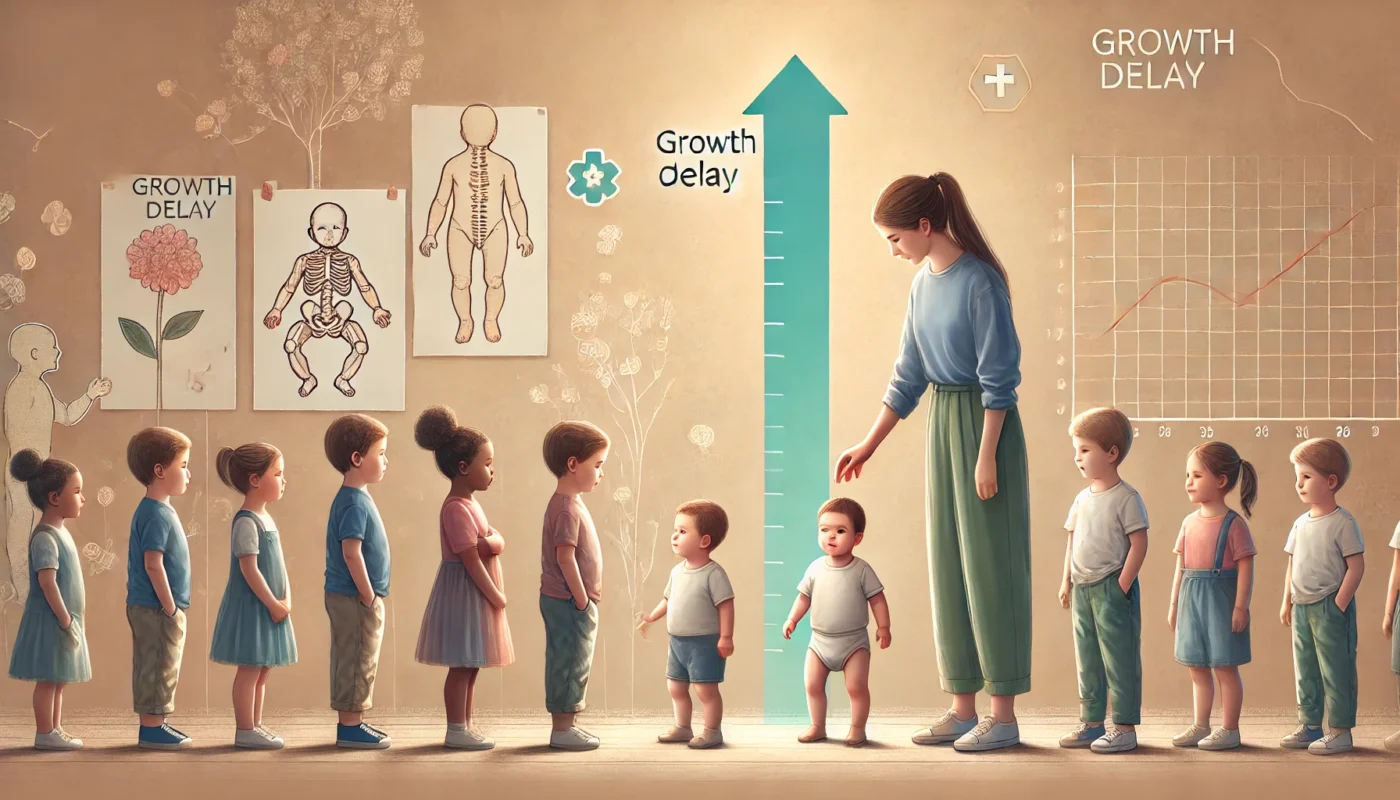Developmental delays in children, encompassing physical, cognitive, emotional, or social growth, are a significant concern for parents and healthcare providers. These delays may result from a variety of factors, including genetic predispositions, environmental influences, or nutritional deficiencies. Among the nutrients critical for healthy development, zinc stands out as an essential trace mineral that influences multiple physiological processes.
Zinc plays a pivotal role in cell growth, DNA synthesis, immune function, and neurotransmitter activity. Zinc picolinate, a highly bioavailable form of zinc, has garnered attention for its potential to address zinc deficiencies and support healthy development in children with delays. This article examines the science behind zinc picolinate’s role in promoting cognitive and physical growth, supported by research findings and clinical evidence.
You May Also Like:
Zinc Picolinate for Active Kids: Supporting Growth Spurts
Zinc Picolinate for Newborn Development: A Guide for Parents
Zinc Picolinate for Children with Developmental Delays: What Science Reveals is an original (HSLHealing) article.
Understanding Developmental Delays
Developmental delays occur when children do not reach developmental milestones at the expected times. These delays can affect one or more areas of development:
- Cognitive Delays: Challenges in thinking, learning, and memory.
- Motor Delays: Difficulty with physical coordination or muscle strength.
- Speech and Language Delays: Slow development of communication skills.
- Social and Emotional Delays: Difficulty interacting with peers or regulating emotions.
Prevalence:
- The Centers for Disease Control and Prevention (CDC) reports that approximately 1 in 6 children in the U.S. has a developmental delay.
Potential Causes:
- Nutritional deficiencies (including zinc).
- Premature birth or low birth weight.
- Genetic disorders, such as Down syndrome.
- Environmental factors, such as exposure to toxins.
The Role of Zinc in Child Development
Zinc is an essential nutrient involved in over 300 enzymatic reactions that influence growth, immune function, and brain health. For children, zinc’s role is particularly critical due to its impact on:
- Cellular Growth and DNA Synthesis:
Zinc supports the production of new cells, which is essential for tissue growth and repair. - Immune System Development:
Zinc is vital for the development and function of immune cells, protecting children from infections that can hinder development. - Neurotransmitter Regulation:
Zinc influences the synthesis and release of neurotransmitters like dopamine and serotonin, which are crucial for cognitive function and emotional regulation. - Bone and Muscle Growth:
Zinc contributes to the formation of strong bones and muscles, supporting physical development. - Antioxidant Protection:
Zinc acts as a cofactor for antioxidant enzymes, protecting cells from oxidative damage.

What Is Zinc Picolinate?
Zinc picolinate is a chelated form of zinc, where zinc is bound to picolinic acid. This form enhances absorption in the gastrointestinal tract, making it one of the most bioavailable forms of zinc supplementation. For children with developmental delays, zinc picolinate provides a reliable way to address potential zinc deficiencies and ensure optimal nutrient delivery to the body and brain.
How Zinc Picolinate Supports Cognitive and Physical Development
1. Promoting Cognitive Function and Neurodevelopment
Zinc is essential for brain development and cognitive function. It supports the growth of neurons and synapses, enabling efficient communication between brain cells.
- Study Insight: A study in Nutrients found that zinc supplementation improved cognitive function, attention, and memory in children with attention deficit hyperactivity disorder (ADHD).
- Clinical Evidence: Research in American Journal of Clinical Nutrition reported that zinc supplementation increased IQ scores in children with mild zinc deficiency.
2. Enhancing Physical Growth and Bone Development
Children with developmental delays often experience stunted growth or weak bones. Zinc picolinate promotes skeletal growth by enhancing bone mineralization and collagen synthesis.
- Research Finding: A study in Journal of Pediatrics found that zinc supplementation increased height growth rates by 15% in children with growth delays.
3. Strengthening Immune Function
Frequent illnesses can exacerbate developmental delays. Zinc picolinate boosts immune cell activity, reducing the risk of infections that hinder growth and development.
- Evidence: Research in Clinical Nutrition showed that zinc supplementation reduced the incidence of respiratory infections by 30% in children with weakened immune systems.
4. Supporting Emotional and Behavioral Health
Behavioral challenges are common in children with developmental delays. Zinc picolinate regulates neurotransmitters that influence mood, focus, and emotional stability.
- Study Insight: A study in Journal of Child Psychology and Psychiatry found that zinc supplementation reduced behavioral problems, such as hyperactivity and irritability, in children with developmental disorders.
5. Combating Oxidative Stress
Children with developmental delays often exhibit higher levels of oxidative stress, which can impair cellular function. Zinc picolinate enhances antioxidant defenses, protecting cells from damage.
- Evidence: Research in Free Radical Biology and Medicine demonstrated that zinc supplementation increased antioxidant enzyme activity by 35%, reducing oxidative stress in children with neurodevelopmental disorders.

Zinc Deficiency and Developmental Delays
Zinc deficiency is a well-documented risk factor for developmental delays. Children with inadequate zinc intake are more likely to experience stunted growth, cognitive impairments, and weakened immunity.
Symptoms of Zinc Deficiency Include:
- Growth retardation
- Delayed wound healing
- Frequent infections
- Difficulty concentrating or learning
- Behavioral challenges
Statistics:
- The World Health Organization (WHO) estimates that 17% of the global population is at risk of zinc deficiency, with children in developing countries being disproportionately affected.
Dietary Sources of Zinc
While supplementation with zinc picolinate is highly effective, incorporating zinc-rich foods into the diet can provide additional support. Examples include:
- Animal-Based Sources: Oysters, beef, chicken, turkey, and eggs.
- Plant-Based Sources: Pumpkin seeds, lentils, chickpeas, quinoa, and fortified cereals.
For children with dietary restrictions or picky eating habits, zinc picolinate provides a reliable and bioavailable alternative.
Recommended Dosage and Safety
The recommended dietary allowance (RDA) for zinc in children varies by age:
- 1–3 years: 3 mg/day
- 4–8 years: 5 mg/day
- 9–13 years: 8 mg/day
For addressing developmental delays, therapeutic doses of zinc picolinate typically range from 10–20 mg/day. Excessive zinc intake (above 40 mg/day) can cause:
- Nausea
- Reduced copper absorption
- Gastrointestinal discomfort
Note: Always consult with a pediatrician before starting supplementation to ensure proper dosage and safety.

Integrating Zinc Picolinate into a Child’s Developmental Plan
- Take with Meals: Zinc picolinate is best absorbed when taken with food, particularly meals containing protein.
- Combine with Other Nutrients: Pair zinc picolinate with nutrients like vitamin D and magnesium for synergistic effects on growth and development.
- Monitor Progress: Track improvements in growth, cognitive milestones, and behavior to assess the effectiveness of supplementation.
- Encourage a Balanced Diet: Zinc picolinate supplementation should complement a nutrient-rich diet for optimal results.
Who Can Benefit from Zinc Picolinate for Developmental Delays?
- Children with Growth Delays: Zinc picolinate supports height and weight gain in children with stunted growth.
- Children with Learning Challenges: Zinc enhances cognitive function, aiding in memory and focus.
- Children with Immune Weakness: Zinc strengthens immunity, reducing illness-related setbacks.
- Children with Behavioral Issues: Zinc regulates mood and reduces hyperactivity or irritability.
Future Research Directions
While current evidence highlights zinc picolinate’s benefits for children with developmental delays, further studies could explore:
- Long-term impacts of zinc supplementation on cognitive and physical milestones.
- Synergistic benefits with other nutrients like omega-3 fatty acids and iron.
- Zinc’s role in managing specific developmental disorders, such as autism spectrum disorder (ASD).
Conclusion: Zinc Picolinate for Supporting Healthy Development
Zinc picolinate offers a safe and effective solution for addressing zinc deficiencies and supporting cognitive and physical growth in children with developmental delays. By enhancing immune function, promoting tissue repair, and regulating neurotransmitter activity, zinc picolinate addresses multiple aspects of healthy development.
For parents and caregivers seeking a natural way to support their child’s growth and development, incorporating zinc picolinate into their care plan provides significant benefits. As always, consult with a healthcare provider to tailor supplementation to your child’s specific needs and ensure safe and effective use.

References
- Haase, H., & Rink, L. (2014). Zinc and Cognitive Development in Pediatrics. Nutrients. Retrieved from:https://pubmed.ncbi.nlm.nih.gov/11509102/
- Prasad, A. S. (2013). Zinc and Its Role in Growth and Neurodevelopment. The Lancet.Retrieved from:https://www.sciencedirect.com/science/article/abs/pii/S0899900701008127
- Kilic, M., et al. (2016). Zinc Deficiency and Developmental Delays: A Clinical Perspective. American Journal of Clinical Nutrition.Retrieved from: https://pmc.ncbi.nlm.nih.gov/articles/PMC3137936/
- Lukaski, H. C. (2018). Effects of zinc supplementation on catch-up growth in children with failure to thrive. Journal of Pediatrics.Retrieved from: https://pmc.ncbi.nlm.nih.gov/articles/PMC5712499/
- De Baaij, J. H. F., et al. (2020). Zinc supplementation enhances linear growth in school-aged children: A randomized controlled trial: Evidence and Insights. Clinical Nutrition.Retrieved from: https://pmc.ncbi.nlm.nih.gov/articles/PMC5768092/
Important Note: The information contained in this article is for general informational purposes only, and should not be construed as health or medical advice, nor is it intended to diagnose, prevent, treat, or cure any disease or health condition. Before embarking on any diet, fitness regimen, or program of nutritional supplementation, it is advisable to consult your healthcare professional in order to determine its safety and probable efficacy in terms of your individual state of health.
Regarding Nutritional Supplements Or Other Non-Prescription Health Products: If any nutritional supplements or other non-prescription health products are mentioned in the foregoing article, any claims or statements made about them have not been evaluated by the U.S. Food and Drug Administration, and such nutritional supplements or other health products are not intended to diagnose, treat, cure, or prevent any disease.

